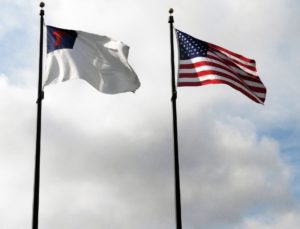 I recently found myself in the city of Amsterdam, which also happens to be where Baptists were born. For two weeks I sat around a table with Baptists from Estonia, Scotland, Bulgaria, Brazil, Lebanon, Lithuania and other countries. The International Baptist Theological Study Centre (IBTS Centre), an outgrowth of International Baptist Theological Seminary that was restructured and relocated from Prague to Amsterdam in 2013, is a home for Ph.D. students and researchers who lead Baptist communities in widely diverse contexts.
I recently found myself in the city of Amsterdam, which also happens to be where Baptists were born. For two weeks I sat around a table with Baptists from Estonia, Scotland, Bulgaria, Brazil, Lebanon, Lithuania and other countries. The International Baptist Theological Study Centre (IBTS Centre), an outgrowth of International Baptist Theological Seminary that was restructured and relocated from Prague to Amsterdam in 2013, is a home for Ph.D. students and researchers who lead Baptist communities in widely diverse contexts.
At this year’s IBTS Colloquium there were researchers pursuing information related to Baptist history, mission workers searching for ways the Holy Spirit is working in secularized countries, and practical theologians studying correlations between communities of faith and cultural changes.
During our conversations, as I considered the challenges facing churches and countries around the world, my eyes and heart were opened. I returned to my church and my community in the United States more emboldened to engage conversations around issues of religious radicalism and religious liberty that had been discussed in Amsterdam.
“Our country and our churches are in desperate need of individuals whose allegiance goes beyond their self-reliance.”
One afternoon the topic of national flags in worship spaces whipped in the winds of a blustering discussion. To my right was a colleague from Kazakhstan who is guiding a community still recovering from the oppression of communism. To my left was an Arabic colleague interested in American Christian Zionism and its impact on the Middle East. For many of the students, the notion of their national flag adorning their sanctuary was preposterous. Students from the United States such as myself, found it challenging to explain the widely accepted practice of American flags hanging in American churches.
I told the group how I grew up in Baptist churches that placed both the American flag and the Christian flag in the sanctuary. Upon hearing this, several students’ faces soured with expressions of shock and dismay. One student from Russia had never heard of the Christian flag, which prompted me to recite my childhood indoctrination: “I pledge allegiance to the Christian flag and to the Savior for whose Kingdom it stands; one Savior, crucified, risen and coming again with life and liberty for all who believe.”
This inspired another American to compare and contrast the Christian and U.S. pledges of allegiance. He quoted, “I pledge allegiance to the flag and to the republic for which it stands, one nation, indivisible, with liberty and justice for all.”
 As the gusts of the colloquy wafted throughout the room, fascinating insights and perspectives rose to the forefront of my thoughts. One student asked for clarification on the word “indivisible.” He said every time he had heard the U.S. Pledge of Allegiance, he thought Americans were saying “individual,” not “indivisible.” The room erupted with laughter.
As the gusts of the colloquy wafted throughout the room, fascinating insights and perspectives rose to the forefront of my thoughts. One student asked for clarification on the word “indivisible.” He said every time he had heard the U.S. Pledge of Allegiance, he thought Americans were saying “individual,” not “indivisible.” The room erupted with laughter.
However humorous at the moment, the reality is that this colleague was picking up on a deeper societal issue in the United States and, dare I say, a theological issue in our churches.
The United States, often perceived by the rest of the world as Christian, is, indeed, one nation made up of individuals – individual people, individual parties, individual communities and individual churches. We pride ourselves on pledging our allegiance to being individual.
However, we American Christians have cultivated an underdeveloped sense of community. We invest an immense amount of energy in radical individualism. Look at how we approach our lives as citizens of this great country and citizens of God’s kingdom. We watch the news (and listen to sermons) only hearing our personal opinions and agendas, especially on controversial topics like gun violence, racism, immigration and sexual identity. Our ears – and hearts – quickly close when someone challenges our world view with a different perspective.
The fear of many individuals is that our freedom will be taken away by forced conformity historically seen in communist countries. However, in our resistance we have become complicit to harmful ideological practices grounded in individualism. We have lost sight of the greater good, justifying our decisions at the polls, our words and actions in public places and our practices in worship spaces by seeing through the narrow lens of “me” instead of “we.”
“We watch the news (and listen to sermons) only hearing our personal opinions and agendas, especially on controversial topics.”
We, followers of Christ and citizens of this free country, have forgotten that unity does not mean conformity. Liberty for everyone does not mean liberty for no one. Freedom is never based on scarcity, as if there is not enough to go around. Freedom, like love, only becomes scarce when individuals choose to live without considering the greater community of all God’s children.
Our country and our churches are in desperate need of individuals whose allegiance goes beyond their self-reliance. We need individuals who pledge to be indivisible from neighbors near and far. Our towns, our cities, our states and our country need courageous followers of Christ who stand in the gap of binary beliefs and polarizing politics. We need Christians to “rise up,” while “lifting up” their sisters and brothers who have been pressed down by systems of greed, hate and apathy.
For God’s sake and for the sake of the world, we need followers of Christ who will humbly join their fellow citizens in working toward the common good, coming together as one nation, indivisible, seeking liberty and justice for all.
